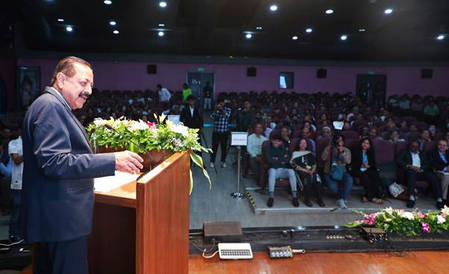Jitendra Singh announces Rs 720-crore quantum fabrication and central facilities at IIT Bombay
Mumbai, Nov 24 (IANS) Union Minister of State (Independent Charge) for Science and Technology, Jitendra Singh, on Monday, announced the establishment of four state-of-the-art quantum fabrication and central facilities worth Rs 720 crore across IIT Bombay, IISc Bengaluru, IIT Kanpur and IIT Delhi under the National Quantum Mission (NQM).
Making the announcement during his visit to IIT Bombay, the Minister said that these cutting-edge facilities mark a decisive leap in India’s journey toward technological sovereignty, positioning the nation among the select global leaders advancing next-generation quantum technologies.
Minister Singh said that under the visionary leadership of Prime Minister Narendra Modi, India has emerged as one of the earliest nations to launch a National Quantum Mission (NQM), reflecting the Union government’s willingness to embrace disruptive ideas and rapidly translate them into national initiatives.
He added that the new fabrication and characterisation capabilities, spanning quantum sensing, quantum computing, and quantum materials, will serve as the foundational hardware ecosystem needed to build sovereign, secure, scalable quantum devices and systems within the country.
These facilities, he said, will be open not only to NQM investigators but also to academia, industry, start-ups, and strategic sectors across India.
Referring to IIT Bombay as one of India’s oldest and most respected science and technology institutions, the Minister noted that the institute has consistently partnered with the Department of Science and Technology since its inception, and continues to be a national leader in deep-tech domains.
He highlighted that IIT Bombay and IIT Kanpur will anchor the nation’s quantum sensing and metrology infrastructure; IISc Bengaluru and IIT Bombay will advance quantum computing fabrication using superconducting, photonic and spin qubits; and IIT Delhi will host India’s quantum materials and device development ecosystem.
These capabilities, according to the Union Minister, will create a controlled environment for prototyping indigenous quantum devices, supporting translational research, and training the next generation of quantum hardware experts.
The Union Minister said the remarkable evolution of science and medical technology over the years, from invasive diagnostic methods of the past to the emerging non-invasive, physics-driven therapeutics of today, and emphasised that quantum technologies will accelerate this transition further, enabling breakthroughs in healthcare, diagnostics, imaging, materials science, and advanced computing.
He added that India’s deep-tech innovations increasingly demand interdisciplinary training, adding that future medical education may very soon require physics as a core component.
He praised institutions like IIT Bombay, IIT Kanpur and IISc for already moving toward integrated medical-tech research ecosystems.
The Minister stressed the importance of breaking silos and fostering multilateral collaboration among major institutes to translate academic R&D into real-world impact.
He cited his own efforts in facilitating multi-institutional MoUs among IITs, AIIMS, IIMs, CSIR labs and communication institutes to ensure stronger market linkages, wider public dissemination of scientific breakthroughs, and more effective outreach to stakeholders such as students, farmers, and start-ups.
–IANS
aps/khz



Comments are closed.